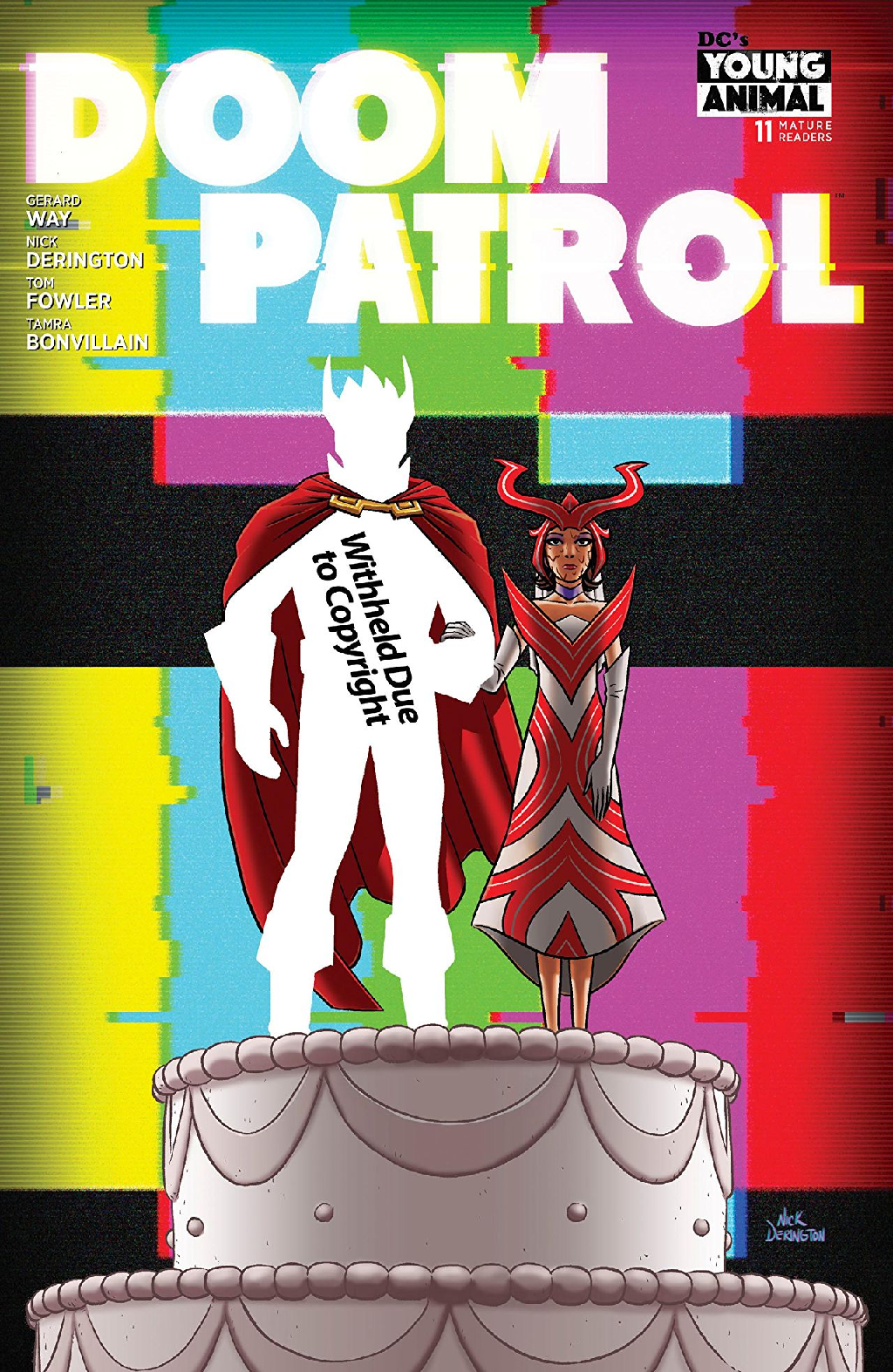Review: Doom Patrol #11
By Jonathan Edwards
Doom Patrol#11 really, really should’ve come out before Milk Wars. I already knew that going in, but after reading through it, it’s pretty baffling that DC would ever let that event happen before this issue. From setting up Milkman Man to establishing this version of Cliff as being from fanfiction to explaining where the Doom Patrol just came from and what they’re talking about at the beginning of JLA/Doom Patrol Special #1, several things from Milk Wars make considerably less sense without first being touched upon here. All that being said, Doom Patrol #11 is itself a great issue with a lot going on in it.
Having previously crash-landed in the Retconn headquarters, the Doom Patrol is quickly captured and brought before the Disappointment. Crazy Jane, of course, remembers him as the person who used Danny the Brick to kill Ahl, God of Superheroes, and the Disappointment remembers Jane too. Subsequently, the Disappointment launches into a full explanation of his backstory, motivations, and his plan to end all of existence. And, somehow, Gerard Way manages to write this much exposition without it being heavy-handed or bogging anything down. In fact, it’s a pretty entertaining read and a testament to Way’s skill as a writer. It even makes it somewhat understandable that Steve Orlando would want to implement Way’s ideas into Justice League of America (even if it didn’t work at all) after working with him.
While all of that goes down, Charles from Retconn also privately meets with the Brotherhood of Nada to pitch them the idea of replacing the Disappointment. Well, sort of. See, the main goal of Retconn is to keep the Eonymous, “the television-addicted gods whose sole purpose is to destroy the universe, but who value entertainment above all else,” preoccupied for all of eternity. So, when the Disappointment killed Ahl and took over Retconn, it became his responsibility to spearhead that charge. Except, now he plans to end everything by cutting Retconn’s broadcast. That’s where the Brotherhood of Nada comes in. Well, again, sort of. Because, while Mister Nobody is thrilled by the offer to make TV for the gods, the rest of the Brotherhood isn’t, so the group disbands.
A part of me wonders if all of this was supposed to set up Milk Wars from the get-go or if it was something Way had to work in later. I wouldn’t be surprised if it were the latter, because, frankly, it works better as a standalone conclusion. After all, we really didn’t need a full-scale universal reset to reintroduce Rita Farr as a member of the Doom Patrol, and Retconn turning into a generically evil megacorporation in Milk Wars inevitably undercuts the idea that it really ever mattered that the Disappointment was in charge. Painting them as a mostly neutral organization keeping the Eonymous at bay through nonideal (but also not excessively nefarious) methods is a far more appropriate and satisfying route to take. Especially when the villainy of Retconn is more or less canceled out by the Brotherhood of Nada’s, and vice versa, once the two groups come together.
With the exception of Doom Patrol #7, Nick Derington’s art has been the consistent aesthetic for this iteration of Doom Patrol, and he never fails to showcase just how perfect a choice he is for that. His style is one perfect for comic books. It’s cartoony while feeling down to earth in its depictions of people and their emotions. It’s both simple and detailed and never too much or little of one or the other. And, he maintains enough abstract spatial awareness that it makes contextual sense whenever his backgrounds are a single color or gradient. Put simply, he constantly puts out great work, and this issue is no exception.
As of my writing of this review, DC has still yet to publicly reschedule Doom Patrol #12, but hopefully, that will change very, very soon. And, I didn’t really feel that way until I read this issue. Don’t get me wrong, I’ve always very much enjoyed this series, especially after recently rereading the first few issues and then finally reading the ones I hadn’t and Milk Wars. But, going from an unfinished story arc to a crossover event where you can feel Way’s unified vision be compromised by co-writer Steve Orlando causes a distinct lack of enthusiasm and resolution that only an issue like Doom Patrol #11 is capable of amending. And, it did just that.
Score: 4/5
Doom Patrol #11
DC's Young Animal


